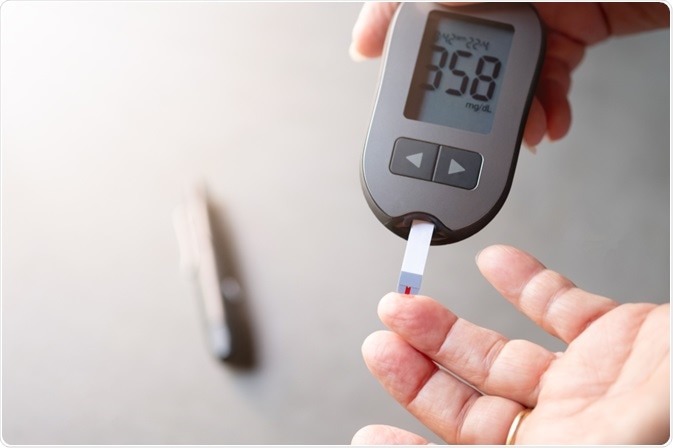Hyperinsulinemia refers to an excess of insulin in the blood. This condition is often associated with type 2 diabetes.

Image Credit: WIN12_ET / Shutterstock.com
What is hyperinsulinemia?
Hyperinsulinemia leads to problems in how the body regulates the amount of glucose circulating in the blood. This means that insulin-producing cells in the pancreas, which are known as the islets of Langerhans, have to produce increasing amounts of insulin in order to maintain the blood glucose at a normal level. The pancreas continues to do this until eventually, it can no longer produce enough insulin to meet the body’s needs, which leads to a rise in the blood sugar level.
Hyperinsulinemia can pose a number of risks, including:
- Raised uric acid levels
- Increased triglycerides
- Weight gain
- Atherosclerosis
- Raised blood pressure
- Type 2 diabetes
There are often no clear indicators of hyperinsulinemia, although the following symptoms may be present:
- Sugar cravings
- Intense hunger
- Poor concentration
- Weight gain
- Increased frequency of hunger
- Feelings of panic or anxiety
- Lack of motivation
- Fatigue
The earlier this condition is diagnosed, the more likely it is that the aforementioned problems can be prevented or the extent of them reduced.
As hyperinsulinemia is a feature of type 2 diabetes, the approaches to treatment are the same. Experts recommend reducing calorie intake, as well as the intake of cholesterol, salt and alcohol.
Other recommended lifestyle changes include reducing stress and increasing exercise. At least 30 to 60 minutes of moderate to vigorous exercise three times a week is advised to help individuals lose weight.
Dietary changes
Even within just a few days of starting a calorie-restricted diet, insulin sensitivity can improve. A diet consisting of whole fresh foods that are high in fiber and have a low glycemic index are recommended. Some examples of these types of food products include vegetables, fruits, wholegrains and beans.
Carbohydrate intake should be moderately low, at around 45% to 65% of the total daily calorie intake. Saturated fats should also be avoided, whereas healthy monounsaturated and omega-3 fats should make up around 25% to 35% of daily calories. Some good sources of monounsaturated fats include nuts, avocados and olive oil, and good examples of omega-3 fats are walnuts and fish.
Saturated fats should be limited to less than 7% of the daily calories and trans-fatty acids to below 1%. Protein should make up 12% to 20% of the daily calorie intake, with legumes, fish, and chicken being examples of good sources.
Exercise and weight loss
Exercise improves how receptive cells are to insulin (insulin sensitivity) and lowers both blood sugar and insulin levels. To improve blood sugar levels, 150 minutes of moderate intensity cardiovascular exercise is recommended each week. The exercise should be carried out on at least three days, with no more than two days passing in-between.
Even losing a small amount of weight can improve insulin sensitivity. To maintain a healthy weight in the long term or achieve major weight loss, at least seven hours of moderate to vigorous cardiovascular exercise is recommended each week.
Reducing stress
Long-term stress can increase the levels of sugar and insulin in the blood. Therefore, people suffering from stress on a regular basis should seek advice to learn ways of alleviating stress.
Medication for hyperinsulinemia
In cases where hyperinsulinemia is not responsive to lifestyle changes, medication may be prescribed to maintain normal blood sugar levels. Some of the drugs that may be prescribed are described below.
Insulin secretion inhibiting agents
An example of an insulin secretion-inhibiting agent is diazoxide, which is a thiazide drug that opens up the potassium adenosine triphosphate (ATP) channel in the beta-cell membrane. This inhibits the release of insulin from the pancreas, as well as stimulates the release of glucose from the liver and catecholamine release, which raises blood sugar levels.
Dextrose and glucose release stimulators
Dextrose or D-glucose is administered intravenously to rapidly elevate blood sugar levels. Glucagon is another substance that can be given intravenously or intramuscularly to raise blood sugar levels. Glucagon stimulates the release of glucose from the liver through hepatic glycogenolysis and gluconeogenesis.
Drugs that inhibit the insulin effect
In cases where patients are nonresponsive to these treatments, growth hormones and cortisol have been used to try and inhibit the effects of insulin, although success has been variable.
Cortisol can reduce the hypoglycemic effects exerted by insulin and may also promote ketogenesis to provide an alternative source of energy. Hydrocortisone possesses glucocorticoid activity and stimulates gluconeogenesis. In turn, long-term use of hydrocortisone causes the pancreas to release glucagon, which then promotes glycogenolysis.
References
Further Reading
Last Updated: Mar 23, 2021